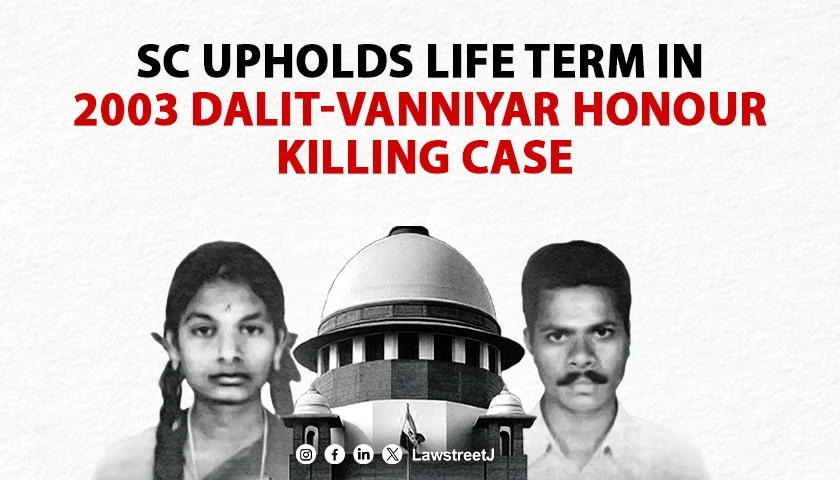NEW DELHI: The Supreme Court on Monday confirmed the conviction and sentence of life term imposed upon a man, his son and others in a case related to 'honour' killing of his daughter, belonging to Vanniyar caste and a Dalit boy, enraged over their act of marriage in Cuddalore district of Tamil Nadu in 2003.
"A wicked and odious crime, as the one we have just dealt with, is the ugly reality of our deeply entrenched caste structure. Honour-killing, as these are called, must get a strong measure of punishment," a bench of Justices Sudhanshu Dhulia and Prashant Kumar Mishra said.
The court said the root of this crime is the deeply entrenched hierarchical caste system in India, and ironically, this most dishonorable act goes by the name of honour-killing!
The bench, while upholding conviction of the girl's family members and two police officers, said, this is a case of a dastardly murder of a young couple, Murugesan, a BE graduate, employed in Bengaluru and Kannagi, a B Com girl, who were only in their early twenties, when they were killed. Both of them were administered poison in full view of a large number of villagers.
"The masterminds and the main perpetrators of this macabre act were none other than the father and the brother of the girl Kannagi. The reason behind the murder of this young couple was that Kannagi, belonging to the ‘Vanniyar’ community, had dared to marry Murugesan, who was a ‘Dalit’ from the same village," the bench said.
Eleven appellants including two police men, in their arguments, contended that the testimonies of the prosecution witnesses were unreliable and there had been a total failure on the part of the prosecution to prove its case beyond reasonable doubt.
The eleven accused, including two police men, who stood convicted and sentenced by the High Court filed an appeal before the apex court.
Maruthupandiyan, girl's brother was sentenced to death penalty by the special court but the High Court has commuted it to life imprisonment.
The court also rejected appellants' contention that the most of the witnesses were relatives.
In cases where the crime is committed at the residence or a place near the residence of the deceased, it is the close relatives who are likely to be a witness to the crime, the bench said.
The court also directed the Tamil Nadu government to pay Rs five lakh as additional compensation to Samikannu-father of Murugesan, and Chinnapillai, step-mother of Murugesan jointly, or to the nearest of their kins.
It found the High Court rightly upheld the conviction of police officers K P Tamilmaran and M Sellamuthu under Sections 217, 218 of IPC and Sections 4, 3(2)(i) of the SC/ST Act and the sentence of life imprisonment. They initially did not lodge the FIR and after pressure from leaders and media did only to implicate innocent persons belonging to Dalit community to absolve culprits belonging to the Vanniyar community of their complicity in the crime.
"Instead of collecting evidence, he created evidence and tried to implicate the innocent and set the guilty loose. In order to fulfil his wicked design, he has deliberately and willfully violated the mandate of Sections 154 and 157(1) of CrPC as well as Section 23 and 24 of the Police Act, 1861," the bench said.
As many as 51 prosecution witnesses were examined but of them, many of them have turned hostile.
"This phenomenon is not new, in fact it is sadly a common occurrence in our criminal courts today, much to the despair and frustration of the prosecution. This case, therefore, is no exception. Despite this, however, there are witnesses in the present case, whose evidence, in the form of their testimonies before the court, is more than sufficient to convict the present appellants," the bench said.
Chinnapillai, the step-mother of Murugesan, was the star witness of the prosecution.
The court also noted, one of the many reasons for witnesses turning hostile is the long delay usually caused in a trial.
"This is again unfortunate but true in our country. The present case is no exception. Here, the incident occurred in the year 2003, the case was committed to Sessions in the year 2010 and charges were framed as late as in the year 2017, and the judgment was finally pronounced by the Trial Court on September 24, 2021. It took eighteen years!," the bench said.
Kannagi and Murugesan, both residents of village ‘Pudukoorapettai’ in District Cuddalore, Tamil Nadu, were in love.
Knowing well that the Vanniyar community, to which Kannagi’s family belonged, would never allow their union, the two got secretly married before the Registrar of Marriage at Cuddalore on May 05, 2003, and got their marriage registered.
However, when the family members of the girl got a whiff of this, they killed the couple and burnt their bodies in different places-Kannagi in the village cremation ground and Murugesan at a place nearby on July 8, 2003.
The FIR was lodged nine days after on July 17, 2003 after pressure from the political leaders and the media.
In 2004, the Madras High Court ordered the CBI investigation.
The incident was of July 7 and 8, 2003, and the Trial was concluded only on September 24, 2021.

















